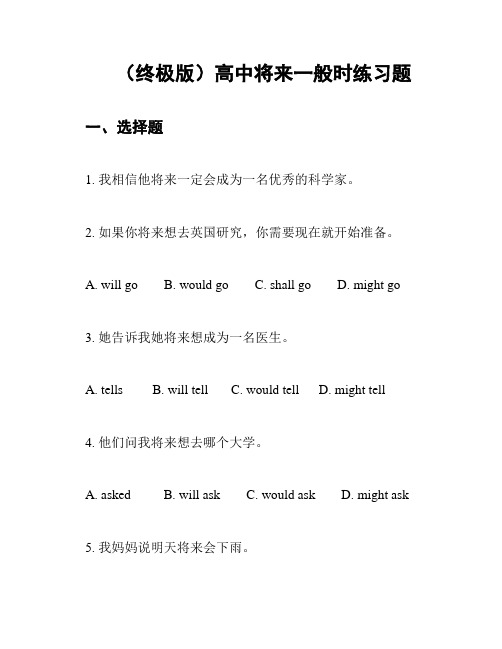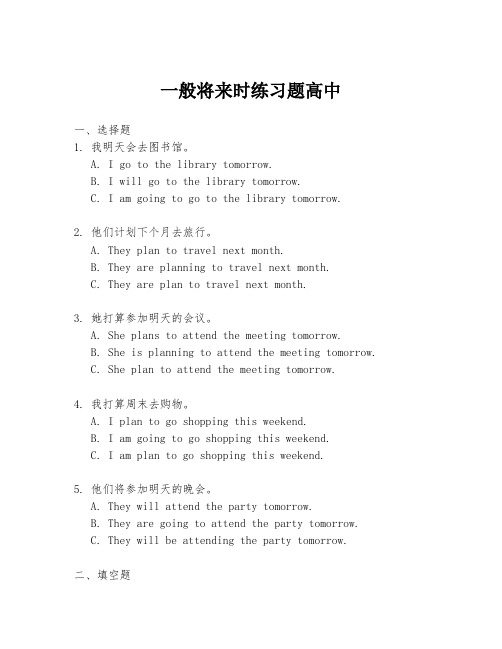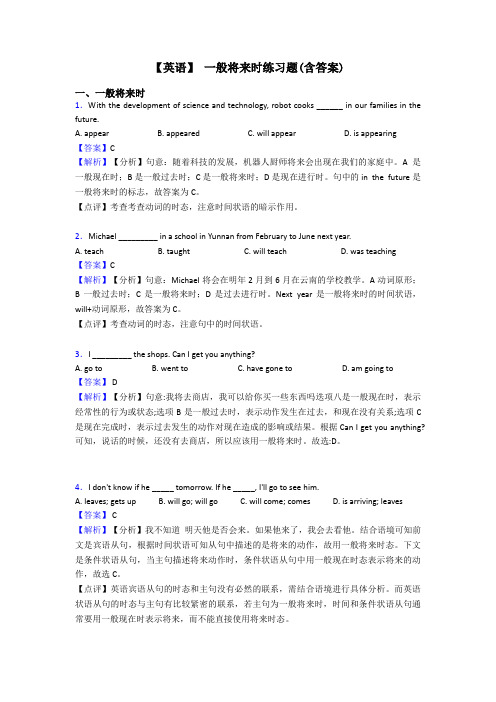(英语)高中英语一般将来时练习题
高一英语一般将来时题20套(带答案)含解析

高一英语一般将来时题20套(带答案)含解析一、单项选择一般将来时1.“What do you want to be?” asked Mrs. Crawford. “Oh, I ________ president,” said the boy, with a smile.A.have been B.amC.was D.will be【答案】D【解析】试题分析:考查动词的时态。
句意:Crawford夫人问道:“你(长大了)想干什么?”“哦,我想当总统。
”男孩面带微笑地说。
根据问句“What d o you want to be?”可知,该句中暗含“when you grow up”,因此回答用一般将来时。
2.We have decided that either you or the headmaster ______ the prize to those gifted students at the meeting tomorrow.A.is handing out B.are to hand out C.are handing out D.is to hand out【答案】D【解析】【详解】考查时态和主谓一致。
句意:我们决定了要么是你要么是校长在明天的会议上把奖品送给那些优秀的学生。
主句中用了现在完成时,宾语从句的时态要与主句一致,宾语从句可以根据需要使用任何时态,宾语从句中的时间状语为tomorrow,宾语从句要用一般将来时。
宾语从句中主语由either...or连接,谓语动词要就近,the headmaster是第三人称单数。
故选D。
【点睛】本题考查了be to do表将来。
一般将来时的形式有以下几种表达:be going to表示计划、打算做某事或者有迹象表明某事要发生。
be to do 表示客观的计划或者安排要做某事,比be going to更强调客观性。
be about to+动词原形,意为马上做某事,不能与tomorrow,next week等表示明确将来时的时间状语连用。
(终极版)高中将来一般时练习题

(终极版)高中将来一般时练习题一、选择题1. 我相信他将来一定会成为一名优秀的科学家。
2. 如果你将来想去英国研究,你需要现在就开始准备。
A. will goB. would goC. shall goD. might go3. 她告诉我她将来想成为一名医生。
A. tellsB. will tellC. would tellD. might tell4. 他们问我将来想去哪个大学。
A. askedB. will askC. would askD. might ask5. 我妈妈说明天将来会下雨。
A. saysB. will sayC. would sayD. might say二、填空题1. 如果我将来有时间,我会去旅游。
if I have time in the future, I will ____________.2. 她告诉他她将来想成为一名作家。
She told him that she will ____________ in the future.3. 老师问我们将来想从事什么工作。
The teacher asked us what we will ____________ in the future.4. 我相信你将来一定会成功的。
I believe that you will ____________ in the future.5. 他们说明天将来会下雪。
They said that it will ____________ tomorrow.三、改写句子1. 我将来想成为一名翻译。
2. 她告诉他她将来想去巴黎留学。
She told him that she would like to study in Paris in the future.3. 他说他将来想开一家自己的公司。
4. 我们问他们将来想做什么。
We asked them what they will do in the future.5. 他们说明天将来会举行一场音乐会。
一般将来时练习题高中

一般将来时练习题高中一、选择题1. 我明天会去图书馆。
A. I go to the library tomorrow.B. I will go to the library tomorrow.C. I am going to go to the library tomorrow.2. 他们计划下个月去旅行。
A. They plan to travel next month.B. They are planning to travel next month.C. They are plan to travel next month.3. 她打算参加明天的会议。
A. She plans to attend the meeting tomorrow.B. She is planning to attend the meeting tomorrow.C. She plan to attend the meeting tomorrow.4. 我打算周末去购物。
A. I plan to go shopping this weekend.B. I am going to go shopping this weekend.C. I am plan to go shopping this weekend.5. 他们将参加明天的晚会。
A. They will attend the party tomorrow.B. They are going to attend the party tomorrow.C. They will be attending the party tomorrow.二、填空题6. 我_________(会见)我的朋友下周。
A. meetB. will meetC. am going to meet7. 他_________(不会迟到)会议。
A. won't be late forB. will be late forC. is going to be late for8. 我们_________(将讨论)这个问题在下次会议上。
(英语)高考英语一般将来时题20套(带答案)含解析

(英语)高考英语一般将来时题20套(带答案)含解析一、单项选择一般将来时1.—May I speak to your manager at 4:00 this afternoon?—Sorry, sir. He ________ to a meeting soon.A.would go B.has gone C.will have gone D.is going【答案】D【解析】试题分析:句意:我今天下午4点能和你们总经理说话吗?---对不起先生,他很快就去开会了。
时间是soon,所以用一般将来时,这里用现在进行时代替一般将来时,所以选D。
考点:考查时态2.The students have been working hard on their lessons and their efforts _____ with success in the end.A.rewarded B.were rewardedC.will reward D.will be rewarded【答案】D【解析】【分析】【详解】本题考查时态和语态。
解题步骤:1. 确定时态:根据句尾的in the end可知,事情发生在将来,用将来时。
2. 确定语态:efforts和reward是被动关系,应该使用被动语态。
句意:学生们一直在刻苦学习功课,他们的努力终将会得到回报。
综上,用一般将来时的被动,故选D。
【点睛】一般将来时1. 表示未来的动作或状态常用will / shall + 动词(常与表示将来的时间状语边用如tomorrow、next week等)。
2. 表示一种趋向或习惯动作。
例如:We’ll die without air or water.3. 表示趋向行为的动词如come, go, start, begin, leave等词常用进行时的形式表示将来时。
4. be going to与will / shall, be to do, be about to do用法及区别:(1)shall / will do表示未事先考虑过,即说话时临时作出的决定。
高考英语一般将来时题20套(带答案)

高考英语一般将来时题20套(带答案)一、单项选择一般将来时1.We are confident that the environment ______ by our further efforts to reduce pollution. A.had been improved B.will be improvedC.is improved D.was improved【答案】B【解析】试题分析:考查时态。
根据“我们相信”说明时间将来发生,所以用将来被动。
【名师点睛】这题考查的是不同时态的被动语态。
关键是确定时态。
要抓住句子的上下文含义和句中的时间状语。
这句话没有明确的时间状语。
这时要根据上下文的语境选择合适的时态,对句意的理解就很关键了。
2.— What do you want for breakfast, Joe?— I think I _______ some bread and milk.A.will have B.am going to have C.had D.am having【答案】A【解析】试题分析:句意:--早饭你准备吃什么?--我想我想吃些面包和牛奶。
因为是将要吃..用一般将来时,排除C,ABD都可以表示一般将来时,will是临时决定,be going to do是计划,打算,be doing是即将,马上做…,所以选A。
考点:考查时态3.Only by practising a few hours every day ________ be able to play the piano well.A.you would B.would you C.you will D.will you【答案】D【解析】试题分析:考查倒装句和时态:句意:只有你每天练习几个小时,你才能把钢琴弹好。
Only+副词/介词短语/状语从句+主句(主句用部分倒装),而且这句话的时间是every day,所以用一般现在时will,选D。
高考英语一般将来时经典习题(含答案)题库

高考英语一般将来时经典习题高考英语一般将来时经典习题((含答案含答案))题库题库一、单项选择一般将来时1.Japan’s economy Japan’s economy in the past twenty years. No one knows how long it before it regains its in the past twenty years. No one knows how long it before it regains its increase.A .has been declining; will beB .has declined; would beC .had been in decline; would takeD .was on the decline; will take 【答案】A 【解析】试题分析:考查时态辨析。
根据句意和时间指示词in the past twenty years 和介词before 可以判断前后应该分别采用现在完成进行时和一般将来时。
句意:日本经济在过去20年里一直在下滑。
谁也不知道在它恢复增长前还需要多长的时间。
根据句意可以判断,故选A 。
考点:考查时态辨析2.AC Milan has confirmed that the England star David Beckham ______the team soon. A .has rejoined B .was going to rejoin C .rejoined D .is to rejoin【答案】D 【解析】试题分析:考查时态。
本句考查的是将来时的一种表达法be to do sth 将要做某事;句意:AC 米兰俱乐部确认英国球星贝克汉姆将很快就重新加盟该队。
本句的关键词是soon 该词经常与将来时连用。
故D 正确。
考点:考查将来时的表达法点评:在英语中将来时有多种表达法。
【精品】高中英语一般将来时经典习题(含答案)

【精品】高中英语一般将来时经典习题(含答案)一、单项选择一般将来时1.If Kate goes to the gym this weekend, _______.A.so do I B.so I doC.so will I D.so I will【答案】C【解析】试题分析:句意:如果凯特这个周末去体育馆,我也去。
If引导的条件状语从句用一般现在时态表示一般将来时态,主句用一般将来时态;又因为前句说Kate去体育馆,后句说I也去体育馆,故用全部倒装。
故选C。
考点:考查时态和全部倒装句。
2.AC Milan has confirmed that the England star David Beckham ______the team soon. A.has rejoined B.was going to rejoinC.rejoined D.is to rejoin【答案】D【解析】试题分析:考查时态。
本句考查的是将来时的一种表达法be to do sth将要做某事;句意:AC米兰俱乐部确认英国球星贝克汉姆将很快就重新加盟该队。
本句的关键词是soon该词经常与将来时连用。
故D正确。
考点:考查将来时的表达法点评:在英语中将来时有多种表达法。
Be to do sth表示计划的事情;或者表示注定要做某事;也可以表示命令做某事,相当于have to, must,should; will表示一般的将来,或者临时决定做某事;be going to do sth表示按照计划安排要做某事;或者根据某种迹象要做某事;be about to do sth即将做某事,不与表示将来时的时间状语连用。
现在进行时表示一般将来时,表示按照计划安排要发生的事情,且动词要是一些表示位置变化的动词。
3.A good film producer must make sure that his films ____ fit into the needs of the changing market.A.are to B.will C.are going to D.are about to【答案】A【解析】试题分析:考查将来时的表达法。
【英语】 一般将来时练习题(含答案)

【英语】一般将来时练习题(含答案)一、一般将来时1.With the development of science and technology, robot cooks ______ in our families in the future.A. appearB. appearedC. will appearD. is appearing【答案】C【解析】【分析】句意:随着科技的发展,机器人厨师将来会出现在我们的家庭中。
A是一般现在时;B是一般过去时;C是一般将来时;D是现在进行时。
句中的in the future是一般将来时的标志,故答案为C。
【点评】考查考查动词的时态,注意时间状语的暗示作用。
2.Michael _________ in a school in Yunnan from February to June next year.A. teachB. taughtC. will teachD. was teaching【答案】C【解析】【分析】句意:Michael将会在明年2月到6月在云南的学校教学。
A动词原形;B一般过去时;C是一般将来时;D是过去进行时。
Next year是一般将来时的时间状语,will+动词原形,故答案为C。
【点评】考查动词的时态,注意句中的时间状语。
3.I _________ the shops. Can I get you anything?A. go toB. went toC. have gone toD. am going to【答案】 D【解析】【分析】句意:我将去商店,我可以给你买一些东西吗迭项八是一般现在时,表示经常性的行为或状态;选项B是一般过去时,表示动作发生在过去,和现在没有关系;选项C 是现在完成时,表示过去发生的动作对现在造成的影响或结果。
根据Can I get you anything?可知,说话的时候,还没有去商店,所以应该用一般将来时。
- 1、下载文档前请自行甄别文档内容的完整性,平台不提供额外的编辑、内容补充、找答案等附加服务。
- 2、"仅部分预览"的文档,不可在线预览部分如存在完整性等问题,可反馈申请退款(可完整预览的文档不适用该条件!)。
- 3、如文档侵犯您的权益,请联系客服反馈,我们会尽快为您处理(人工客服工作时间:9:00-18:30)。
(英语)高中英语一般将来时练习题一、单项选择一般将来时1.— What do you want for breakfast, Joe?— I think I _______ some bread and milk.A.will have B.am going to have C.had D.am having【答案】A【解析】试题分析:句意:--早饭你准备吃什么?--我想我想吃些面包和牛奶。
因为是将要吃..用一般将来时,排除C,ABD都可以表示一般将来时,will是临时决定,be going to do是计划,打算,be doing是即将,马上做…,所以选A。
考点:考查时态2.The students have been working hard on their lessons and their efforts _____ with success in the end.A.rewarded B.were rewardedC.will reward D.will be rewarded【答案】D【解析】【分析】【详解】本题考查时态和语态。
解题步骤:1. 确定时态:根据句尾的in the end可知,事情发生在将来,用将来时。
2. 确定语态:efforts和reward是被动关系,应该使用被动语态。
句意:学生们一直在刻苦学习功课,他们的努力终将会得到回报。
综上,用一般将来时的被动,故选D。
【点睛】一般将来时1. 表示未来的动作或状态常用will / shall + 动词(常与表示将来的时间状语边用如tomorrow、next week等)。
2. 表示一种趋向或习惯动作。
例如:We’ll die without air or water.3. 表示趋向行为的动词如come, go, start, begin, leave等词常用进行时的形式表示将来时。
4. be going to与will / shall, be to do, be about to do用法及区别:(1)shall / will do表示未事先考虑过,即说话时临时作出的决定。
(2)be going to 表示现在打算在最近或将来要做某事,这种打算往往经过事先考虑,甚至已做了某种准备;be going to 表将来,不能用在条件状语从句的主句中;而will do则能,表意愿。
例如:If it is fine, we’ll go fishing.(正确)If it is fine, we are going to go fishing.(错误)(3)be to do sth.表按计划、安排即将发生的动作,还可表示吩咐、命令、禁止,可能性等。
例如:A meeting is to be held at 3:00 o’clock this afternoon.(4)be about to do sth.表示“即将/正要去做某事”,通常不与时间状语连用,但可与when引导的从句连用,构成常考句型:sb was about to do sth when sb did sth。
例如:Autumn harvest is about to start.3.—Your windows are still open? It's so cold!—Oh, sorry. They ________.A.aren't closing B.won't doseC.won't be closed D.aren't closed【答案】B【解析】试题分析:考查close的用法。
由题目可知,不是回答者不关窗,而是窗子由于种种原因(窗子坏了)关不了,they指代窗户为主语,因此为主动。
Close既可作及物动词,又可作不及物动词,此句中为不及物动词,句意为你的窗户还是开的,真是太冷的。
对不起,它们关不了。
故选B。
考点:考查close的用法。
4.If you _____ his wife’s income____ his own,the total of their income _____ 3000 yuan. A.add; to; will add up to B.add; to; adds toC.add up; to; adds up to D.will add; for; adds up【答案】A【解析】试题分析:考查if引导条件状语从句及词的用法。
主句用一般将来时,从句用一般现在时表将来。
排除D。
Add...to 把...加在..., add up to总计达, add to增添。
句意:如果把他妻子的收入和他的收入加起来,总计达3000元。
考点:考查if引导条件状语从句及词的用法点评:if引导条件状语从句主句用一般将来时,从句用一般现在时表将来。
5.It’s your own business. If you don’t attach importance to it, who else ?A.does B.was C.has D.will【答案】D【解析】试题分析:句意:这是你自己的事情,如果你不重视,其他谁会重视呢?因为这句话的条件状语从句用一般现在时代替一般将来时,所以主句用一般将来时。
所以选D。
考点:考查时态6.— What do you want for breakfast, Mike?— I think I _______ some bread and milk.A.am going to have B.had C.will have D.am having【答案】C【解析】试题分析:句意:--迈克,你早饭想吃什么?--我想吃一些面包和牛奶。
因为是将来的事情,所以用一般将来时,will表示临时决定,符合句意,be going to计划,打算,be doing 即将做,都不符合句意。
所以选C。
考点:考查时态7.If our marketing plan succeeds, we _______ the sales by thirty percent next year. A.would increase B.will increaseC.would have increased D.will be increasing【答案】B【解析】试题分析:考查时态。
If条件句使用的是一般现在时代替一般将来时,所以主句也是一般将来时,和next year搭配使用。
句意:如果我们的营销计划成功,我们明年销售将增加百分之三十。
故B正确。
考点:考查时态8. It is required that the students _____ mobile phones in their school, so seldom _____ them using one.A.should not use; you will seeB.mustn’t use; will you seeC.not use; you will seeD.not use; will you see【答案】D【解析】试题分析:考察情态动词。
前一个空中,should表示劝告,义务,建议,命令,其同义词是ought to ,在疑问句中,通常用should代替ought to。
后一个空前面有否定词seldom所以将will提前构成部分倒装。
该句意思为:学生在他们学校被要求不要使用手机,所以你很少看见他们用手机。
根据句意,故选D考点:考察情态动词。
9.Only after one has become a parent _____ how great his parents are.A.he will realize B.will he realize C.that he realizes D.he does realize 【答案】B【解析】试题分析:句意:只有一个为人父母了,他才知道父母多么的伟大。
Only+副词/介词短语/状语从句,并放在句首的时候,后面的主句用部分倒装,助动词/be动词/情态动词放在主语前面,所以选B。
10.Only when you can find peace in your heart _____good relationships with others.A.will you keep B.you will keep C.you kept D.did you keep【答案】A【解析】试题分析:考查倒装结构用法。
only修饰句子的状语(从句)位于句首时,句子的主句要用部分倒装。
结构为:only+状语/状语从句+ be/ 助动词/情态动词+主语。
根据从句的can可以排除D项。
句意:只有当你在你心中找到宁静的时候,你才会与其他人保持好的关系。
故A正确。
考点:考查倒装结构用法11. - Will you be available at three o'clock tomorrow afternoon?- No. I ______ a lecture then.A.are attending B.will have attended C.will attend D.will be attending 【答案】D【解析】试题分析:考查动词时态。
题意:“明天下午3点你有空吗?”“没空。
我要听一个报告。
”答句说的是未来某个时间点正在进行的动作,所以要用将来进行时态。
D项正确。
考点:时态。
12.If my brother doesn’t go to the evening party, .A.neither do I B.I will either C.either will I D.nor will I【答案】D【解析】试题分析:考查倒装句:句意:如果我弟弟不去晚会,我也不去。
Neither/Nor+倒装句,表示“…也不是”,因为if条件句用一般现在时,代替一般将来时,所以主句是一般将来时,选D。
考点:考查倒装句13.The computers made by our company sell best, but several years ago no one could have imagined the role in the markets that they ________.A.were playing B.were to play C.had played D.played【答案】B【解析】试题分析:考查时态:我们公司生产的电脑卖的最好,但是几年以后没有人能想象它曾经将在市场中扮演什么样重要的角色。
were to do是过去将来时,表示过去想象电脑将会起到的作用。
选B。
14.--- I’d like a mountain bike which ____ well?--- Will this one _____?A.rides; work B.rides; do C.is ridden; do D.is ridden; work【答案】B【解析】试题分析:考查主动形式表示被动含义用法。
